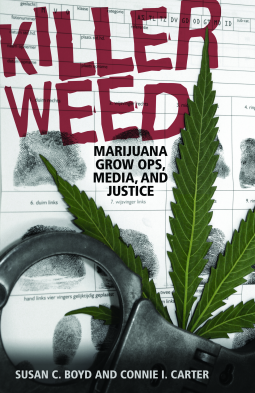
Killer Weed
Marijauna, Grow Ops, Media and Justice
by Susan C. Boyd and Connie I. Carter
This title was previously available on NetGalley and is now archived.
Send NetGalley books directly to your Kindle or Kindle app
1
To read on a Kindle or Kindle app, please add kindle@netgalley.com as an approved email address to receive files in your Amazon account. Click here for step-by-step instructions.
2
Also find your Kindle email address within your Amazon account, and enter it here.
Pub Date Jan 14 2014 | Archive Date Jan 19 2014
Description
Killer Weed illustrates how and why marijuana grow ops have been portrayed by law enforcement and the media as a criminal activity of epic proportions and how their regulation is changing civil society, municipal authority, and the criminal justice system in British Columbia. In their study, Susan C. Boyd and Connie I. Carter collected and analysed more than 2500 newspaper articles published in national, provincial, and local newspapers in British Columbia from 1995 to 2009, focusing on the origins and impact of the discourse surrounding grow ops. They conclude that when it comes to marijuana cultivation the media frequently exhibit similar perspectives and draw on the same spokespeople, especially representatives from law enforcement.
Looking beyond media representations, Killer Weed also examines civil responses to illegal drug production and sales. Before now there has been little research into these policies. Boyd and Carter explore the intersections between criminal justice, civil society, and the regulation by insurance companies and public utilities of marijuana grow ops and the people who operate them.
Through an examination of court challenges, reports, and legal and civil initiatives, the book contextualizes and supplements the coverage of marijuana grow ops offered by newspaper reporting. It discusses global drug reforms initiatives and Canada’s Safe Streets and Community Act, which enacted mandatory minimum sentences for some drug offences. Finally, it concludes with a critical analysis of the current Canadian approach to the control of drugs in light of the contemporary global movement to legalize and regulate marijuana.
SUSAN C. BOYD is a professor in the Faculty of Human and Social Development at the University of Victoria.
CONNIE I. CARTER is a senior policy analyst for the Canadian Drug Policy.Advance Praise
“This book demonstrates in dramatic detail that cannabis cultivation in Canada is nothing like what it has been portrayed to be. Indeed, if politicians and the media were held to the same professional standards as physicians, they would be sued for malpractice. Boyd and Carter have done prodigious work in exposing the fear-based myths that have been built around “grow ops.” Many of us in the US have looked to Canada in the hope that its drug policies would be wiser and more humane than those of their big neighbor to the south, and would avoid the racist and repressive tactics that pass for drug policy here. But the authors provide a wealth of fascinating evidence showing that when it comes to failed drug wars, Canada can hold its own.”
Craig Reinarman, Professor of Sociology and Legal Studies, University of California, Santa Cruz
“Killer Weed is a work of critical scholarship that is bound to go up the noses of politicians, legislators, and policy-makers. The book is based on a large fifteen-year sample of newspaper articles about marijuana grow ops and their perceived connections to the worlds of law, politics, crime, and justice. It is a project that blends social construction theory, feminist theory, and cultural criminology to examine media representations of marijuana cultivation and to explain their social significance in relation to race, class, age, and family. The interpretation of the data is intelligent, comprehensive, and convincing, and the book makes a major contribution to drug studies, media studies, criminal justice politics, and critical social policy.”
John McMullan, Professor of Sociology and Criminology, Saint Mary’s University
Marketing Plan
Excerpts
National Interviews
National Reviews
Conferences
Scholarly Journals
Excerpts
National Interviews
National Reviews
Conferences
Scholarly Journals
Available Editions
| EDITION | Paperback |
| ISBN | 9781442612143 |
| PRICE | CA$29.95 (CAD) |











